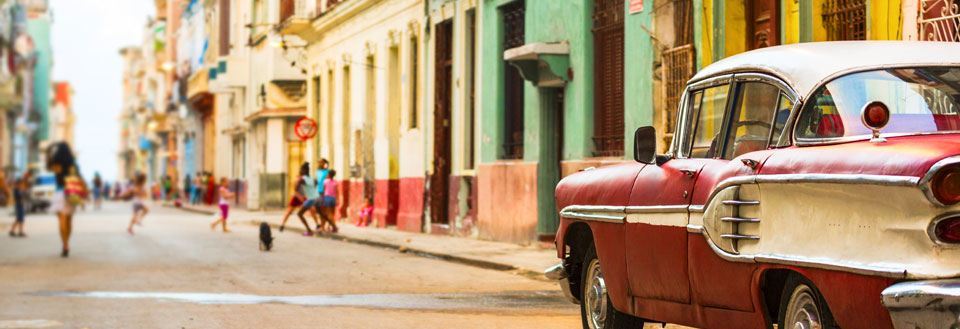
The 56 archaeological excavations found in the area surrounding Baracoa are fantastic opportunities for those who are interested in archaeology, and would like to know more about the way of life of the earliest Cuban Indians.
The cross called Cruz de la Parra, which Christopher Columbus is said to have erected here, is one of the treasures of this church.
Between 1639 and 1742 three forts were built to protect the town of Baracoa. In 1652 the oldest of the three, El Castillo was severely damaged by the French, and today the fort has been turned into a hotel. The second fort, Fuerte la Punta is now a restaurant, while Fuerte Matachín, the last of the forts, houses one of the town's historical museums.
This is the main town near the biosphere reserve covering 260 square kilometres of eastern Sierra del Rosario. Among other things, the town is the home of an ecological research centre and a museum, and in the reserve and surrounding coffee plantations there are great routes for an exciting walk.
This cave system just east of Havana consists of three kilometres of underground springs, surrounded by mysterious stalagmites and stalactites working to meet.
The former presidential residence is situated in La Habana Vieja on the left side of Plaza de Armas, where what was believed to be the mortal remains of Christopher Columbus was buried, until they were moved to the cathedral. The residence is now the Historical Museum of Havana, Museo de la Ciudad, and a visit here will provide you with an insight into the development of the city over the course of time.
In the province of Matanzas you will find this reconstructed Indian town, which has been built on islands connected by a number of wooden bridges. To honour the aboriginal Cuban population, numerous sculptures are found in the town, portraying its inhabitants doing daily chores typical of those days.
For those who go to Havana for the tobacco, a visit to this factory is a must. The Partagas cigar factory is located in the old part of Havana, and produces 4 different cigar brands. Guided tours are offered a couple of times a day, during which you can stop at the gift shop, that will make even a connoisseur's collection look like an amateur's cigar box.
As did much of the pirate riff-raff of those days, the notorious pirate Henry Morgan hid from his pursuers on this island, which was formerly known as Parrot Island. This is the largest of 350 small islands, which make up the Archipiélago de los Cannarreos, and furthermore it was the source of inspiration for the writer Robert Louis Stevenson when writing the book Treasure Island. The coral islands a little offshore are the home of turtles, pelicans and iguanas, and is the perfect setting for a dive.
In the country town of Matanzas you will find a neo-classicist style theatre, in which 775 people can watch a play, ballet or opera sitting in elevated balconies. If needed, the floor of the Teatro Sautos can be elevated, turning the room into a ballroom.
Right by the harbour entrance in the old part of Havana you will find the Castillo el Morro Museum, which has opened in an old fort. At night the fort is lit up, and from here you can enjoy the remarkable view of Havana. Every night at 9 o'clock, men dressed in English military uniforms discharge canon shots from the old fort. The cone of light from the fort's lighthouse can be seen 30 kilometres away.
The Cathedral of Havana is located in the old part of town, and this is where the earthly remains of Christopher Columbus are said to be buried. The Cathedral, which dates back to 1704, is built of limestone and contains a number of beautiful sculptures, altarpieces and paintings.
This square is where Fidel Castro makes his speech to his compañeros at the gigantic Labor Day Parades, and here you will also find a monument built in honour of José Martin, from which there is access to a spectacular look-out turret.
Due to their high concentration of minerals and salt, the thermal baths of los Baños Romanos are said to have curative powers.
The plantations of Pinar del Río are the place to go for tobacco lovers. Here, in the landscape of this beautiful region, some of the tobacco for the 160 million cigars exported from Cuba each year is grown.
In the 16th-century house of Diego Velásquez the conquistador you will find a museum which portrays various periods in Cuban history through its décor. Each room has been kept in a simple style, in order for the visitors to get a general impression of each period from the furniture, the china, the works of art, and other things that are typical for a certain time.
During the revolution Fidel Castro attacked this former military facility, and later on turned it into a school. On the 10th anniversary of the attack part of it was turned into a museum portraying the city during the revolution.
Apart from the Bacardi-brothers, several legendary people from the revolution have been laid to rest here. A gigantic mausoleum has been built at the cemetery in honour of the great patriot, poet and martyr, José Martí, who fought for a Cuba free of the trammels of the Spanish colonial rulers.
The museum has exhibits about history, science and culture, and apart from that, the museum is a beautiful building in itself, with a tower from where you can enjoy the spectacular view of Trinidad.
Found on Plaza Mayor, the central square in town, this church is the largest one in Cuba. It was built in the 20th century, and is renowned for its amazing acoustics.
In this small tourist town located only a few kilometres outside Trinidad you will find clear, blue water and beautiful, white sandy beaches, and just 300 metres offshore there are great diving conditions.